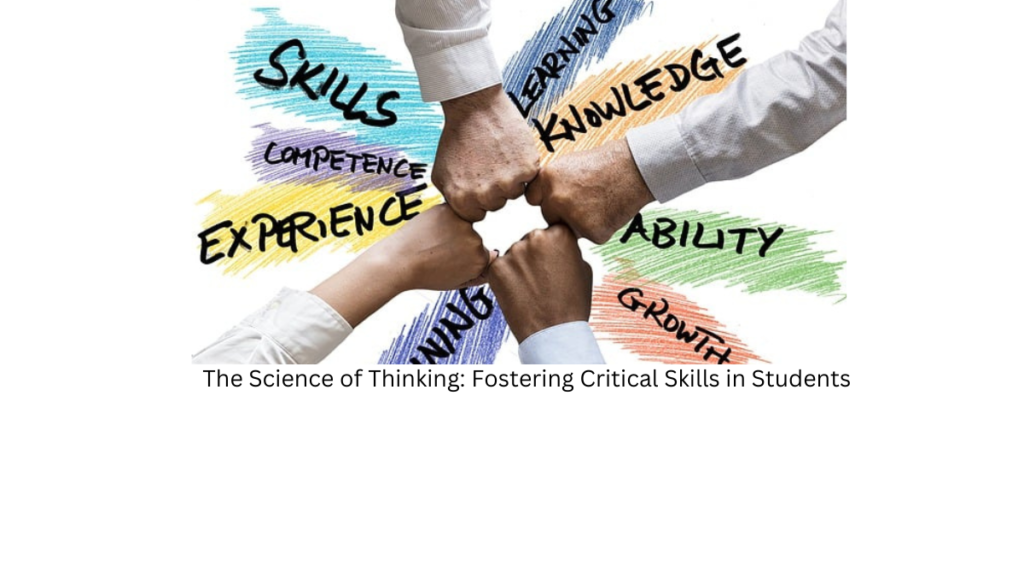Introduction:-
The Science of Thinking: Fostering Critical Skills in Students

In today’s rapidly changing world, the ability to think critically and solve complex problems is more important than ever. As students embark on their educational journey, science education plays a pivotal role in nurturing these vital skills. In this article, we will explore the science behind critical thinking and problem-solving and how education can foster these skills in students.
What is fostering critical skills thinking for students?
Fostering critical thinking for students means teaching them how to think critically, which is the ability to think clearly and rationally about what to do or what to believe. It involves the ability to analyze information, evaluate arguments, and make sound judgments.

Critical thinking is an essential skill for success in school, work, and life. It helps students to learn more effectively, solve problems creatively, and make informed decisions.
There are many ways to foster critical thinking in students. Here are a few examples:
- Ask open-ended questions. Instead of asking questions that have one right answer, ask questions that require students to explain their reasoning or consider multiple perspectives. For example, instead of asking “What is the capital of France?”, ask “Why do you think Paris is the capital of France?” or “What are the pros and cons of making Paris the capital of France?”
- Provide students with opportunities to work on authentic tasks. Authentic tasks are tasks that are relevant to students’ lives and interests, and that require them to apply their knowledge and skills to real-world problems. For example, instead of asking students to write a research paper on a topic of their choice, ask them to design a solution to a problem in their community.
- Encourage students to collaborate and share their ideas. When students work together, they can learn from each other and challenge each other’s thinking. For example, you could have students work in small groups to solve a problem or to create a presentation.
- Model critical thinking yourself. Students learn by watching the adults in their lives. When you think critically about the information you consume and the decisions you make, you are modeling critical thinking for your students.
Fostering critical thinking in students takes time and effort, but it is a valuable investment. Critical thinkers are better equipped to succeed in school, work, and life.
Here are some additional tips for fostering critical thinking in students:
- Create a safe and supportive learning environment. Students need to feel comfortable sharing their ideas and asking questions without fear of being judged or ridiculed.
- Teach students about the different critical thinking skills. These skills include identifying assumptions, evaluating evidence, and drawing conclusions.
- Provide students with regular opportunities to practice critical thinking skills. This can be done through classroom activities, homework assignments, and assessments.
- Give students feedback on their critical thinking skills. This feedback should be specific and helpful, and it should focus on the student’s reasoning, not on their answers.
By following these tips, you can help your students to develop the critical thinking skills they need to succeed in school, work, and life.
The Foundation of the Science of Thinking and Problem-Solving
Critical thinking and problem-solving are cognitive processes that involve analyzing information, making informed decisions, and finding solutions to challenges. These skills are not innate but can be developed and honed over time. Science education serves as a powerful platform for cultivating these abilities.
1. Encouraging Curiosity
At the heart of critical thinking is curiosity – the desire to explore, question, and understand the world around us. Science education sparks this curiosity by introducing students to fascinating phenomena and encouraging them to ask “why” and “how.” Through hands-on experiments, observations, and inquiry-based learning, students develop a natural inclination to explore and seek answers.

2. Developing Analytical Skills
Science education provides students with the tools to collect and analyze data. Whether it’s conducting experiments in a laboratory or analyzing real-world data sets, students learn how to gather information systematically and draw meaningful conclusions. This analytical thinking is a fundamental aspect of problem-solving.
3. Emphasizing Evidence-Based Reasoning
In science, conclusions are drawn based on evidence. Students learn to evaluate the reliability of data and the validity of claims. This emphasis on evidence-based reasoning helps them become critical consumers of information, able to distinguish between credible sources and misinformation in an age of abundant information.
4. Fostering Creativity
Critical thinking is not limited to analytical skills; it also involves creativity. Science education encourages students to think creatively by exploring new hypotheses and innovative solutions to problems. In the process, they learn that there is often more than one way to approach a challenge.
5. Promoting Problem-Solving Strategies
Problem-solving is an integral part of scientific inquiry. Students engage in hands-on activities and experiments that require them to identify problems, formulate hypotheses, and devise solutions. These problem-solving strategies are transferable to various aspects of life.
6. Encouraging Collaboration
Science education often involves collaborative projects and group discussions. Working with peers allows students to share ideas, consider different perspectives, and refine their thinking. Collaboration also mirrors the real-world scenario where diverse teams tackle complex problems.
7. Building Resilience
Science experiments do not always yield the expected results. Students encounter setbacks, failures, and unexpected outcomes. These experiences teach resilience and the importance of learning from mistakes – a crucial aspect of problem-solving.
8. Connecting Theory to Real Life
Science education bridges the gap between theoretical knowledge and practical application. Students learn that scientific concepts have real-life relevance, from environmental issues to healthcare advancements. This connection between theory and practice enhances their problem-solving skills.
9. Encouraging Inquisitiveness
Critical thinkers are naturally inquisitive. Science education cultivates this trait by encouraging students to ask questions, seek answers, and never stop exploring. This inquisitiveness extends beyond the classroom and into lifelong learning.
10. Preparing for the Future
In a world where the job landscape is continually evolving, the ability to think critically and solve problems is highly sought after by employers. Science education equips students with these essential skills, making them adaptable and well-prepared for the challenges of the future.
Conclusion:
The Transformative Power of Science Education
“The Science of Thinking: Fostering Critical Skills in Students” highlights the transformative impact of science education on young minds. It instills curiosity, analytical thinking, evidence-based reasoning, and problem-solving abilities that are essential not only in academics but also in everyday life and future careers. As we nurture the next generation of critical thinkers and problem solvers through science education, we empower them to face the complex challenges of our ever-changing world with confidence and competence.
https://youtu.be/0XtJzy5Gyl4?si=mDQYu-aoyTqecCw6





